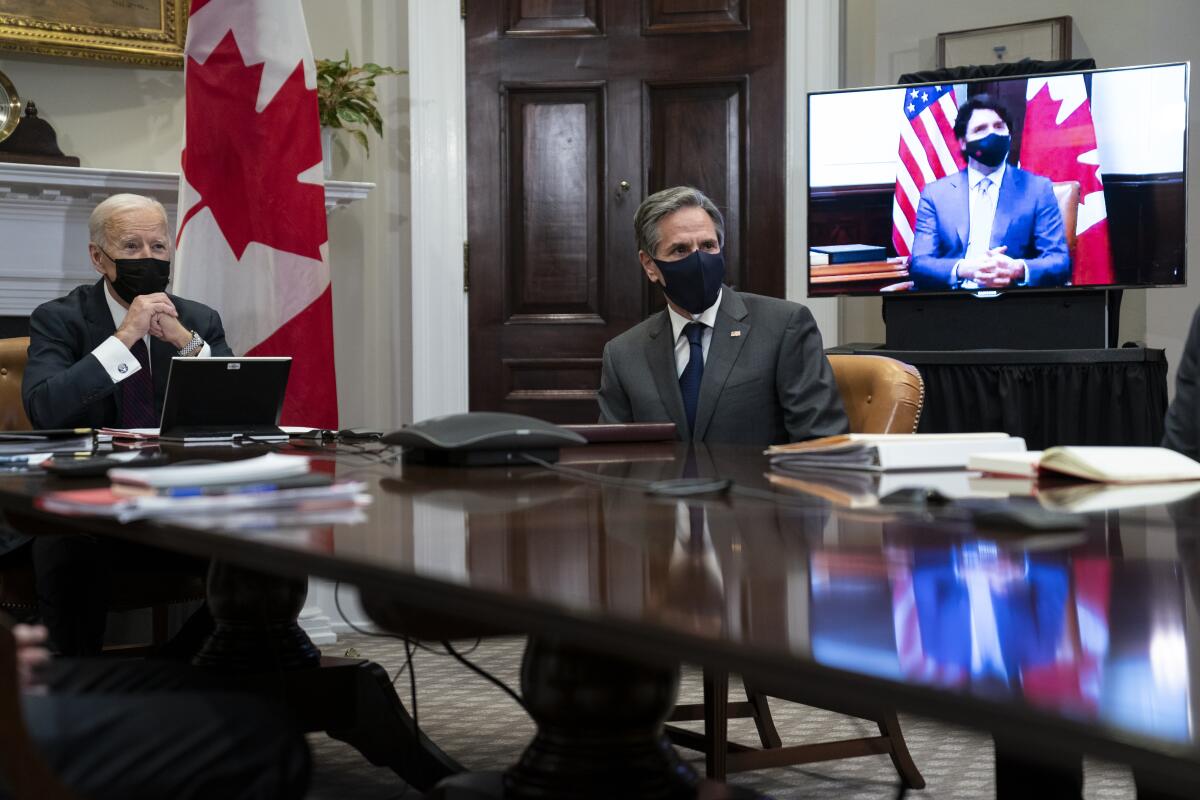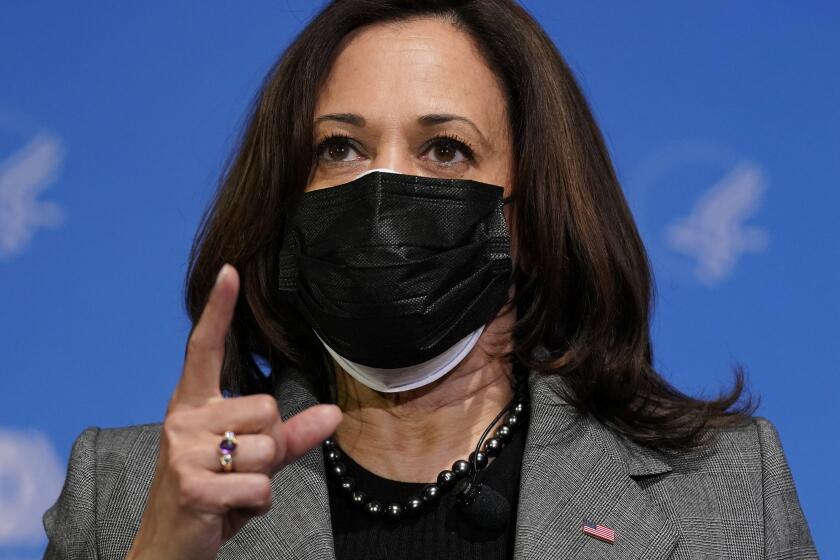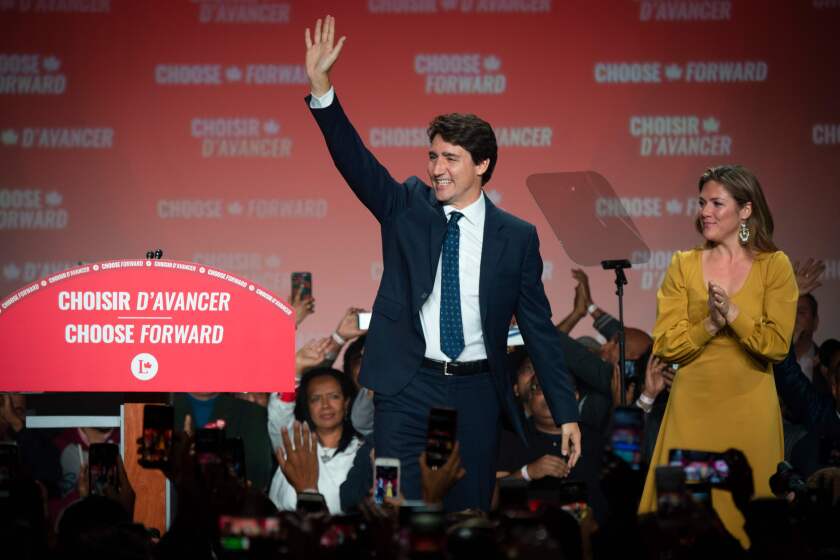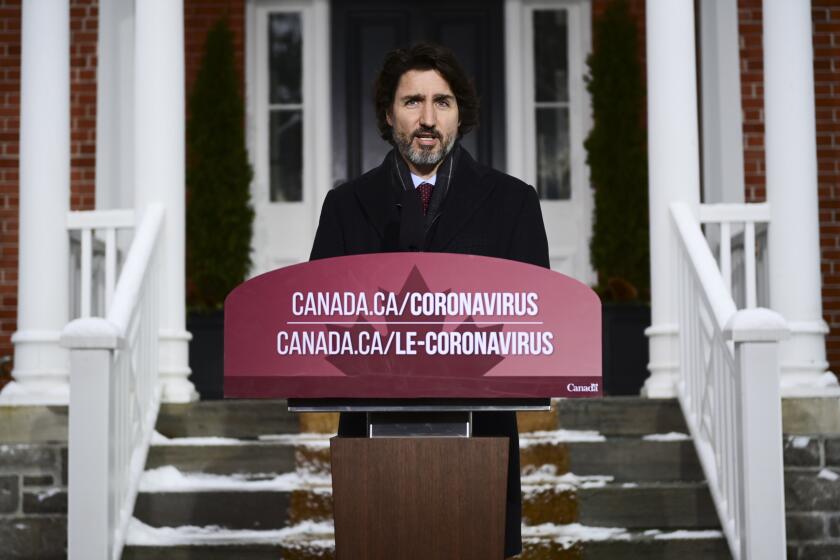More policy, less pomp as Biden and Trudeau meet virtually

- Share via
President Biden’s first meeting with a foreign counterpart since taking office was high on policy and low on pomp Tuesday, as the coronavirus forced him to convene virtually with Canadian Prime Minister Justin Trudeau.
The two leaders — Biden in the Roosevelt Room at the White House, and Trudeau in the prime minister’s office in Ottawa — delivered brief opening remarks in front of the media, with flags from both countries on display at both ends of the long-distance conversation.
“The United States has no closer friend, no closer friend than Canada,” Biden said.
Trudeau, in turn, commended Biden for quickly rejoining the Paris climate accord, the worldwide pact to curb climate emissions from which former President Trump walked away early in his term. The prime minister, who had a frosty relationship with Trump at times, took a jab at him as he praised Biden.
“U.S. leadership has been sorely missed over the past years,” remarked Trudeau. “And I have to say as we were preparing the joint rollout of the communiqué on this, it’s nice when the Americans are not pulling out all the references to climate change and instead adding them in.”
Vice President Kamala Harris pledges help in the release of two Canadian citizens detained by China in call with Canadian Prime Minister Justin Trudeau.
In pre-pandemic times, such a meeting would have been held with far more fanfare: Biden welcoming the Canadian prime minister with ceremony, an Oval Office talk between the two leaders, a joint news conference and perhaps a luncheon.
But with both leaders stressing caution to their citizens, Biden and Trudeau set aside the protocol and held their talks by videoconference.
U.S. presidents traditionally invite the Canadian prime minister for their first meeting with a world leader.
While cable stations in the U.S. stuck with breaking news about golfer Tiger Woods’ serious car crash, Canada’s CTV and CBC carried the leaders’ remarks live.
Joining Biden for the meeting were Vice President Kamala Harris, Secretary of State Antony J. Blinken, national security advisor Jake Sullivan and the National Security Council’s Juan González, who serves as senior director for the Western Hemisphere. Trudeau brought Deputy Prime Minister and Finance Minister Chrystia Freeland; Foreign Affairs Minister Marc Garneau; Canada’s ambassador to the United States, Kirsten Hillman; and chief of staff Katie Telford.
Later, the two leaders were to hold an extended session that was to include several of Biden’s Cabinet-level advisors and Trudeau’s ministers.
The election was much more than a referendum on Trudeau. The results made it clear that Canada is an increasingly diverse and divided nation.
On the agenda were COVID-19 response, climate change, economic issues and more. The White House said the leaders plan to issue a “road map” outlining how the neighboring countries will work together to fight the pandemic, curb climate emissions and pursue other shared priorities. They plan to deliver joint closing statements, with Biden appearing from the White House East Room, at the end of the meeting.
It was unclear whether Trudeau would again raise with the Democratic president the idea of allowing Canada, which is struggling to vaccinate its population, to buy vaccine from pharmaceutical giant Pfizer’s manufacturing facility in Michigan. Canada currently is getting vaccine shipped from a Pfizer plant in Belgium.
Trudeau brought up the issue when the two leaders spoke last month, Biden’s first phone call to a foreign leader as president. But Biden’s “first priority” remains “ensuring every American is vaccinated,” White House press secretary Jen Psaki said ahead of the meeting.
Another area of concern for Trudeau is the “Buy American” executive order that Biden signed during his first week in office. It’s designed to encourage the federal government to spend more of the roughly $600 billion earmarked for procurement to boost U.S. factories and hiring.
With limited exceptions, nonessential air travelers will be required to reserve a three-night stay in a government-authorized hotel at their own expense before they depart for Canada.
Biden said that as part of the push, he was creating a “Made in America” office to evaluate contracts and make sure waivers are used only in “very limited circumstances,” such as when there is an overwhelming national security, humanitarian or emergency need in the U.S. The issue is crucial to Canada, since the U.S. accounts for about 75% of its exports.
“I don’t expect them to make any commitments during the meeting today,” Psaki told reporters Tuesday when asked about the possibility of Canada receiving a waiver to the “Buy American” order.
Trudeau is also expected to again raise concerns to Biden about two Canadians imprisoned in China in apparent retaliation for Canada’s arrest of a top Huawei executive, according to a senior Canadian official familiar with the prime minister’s preparation for the call.
Michael Spavor and Michael Kovrig were detained in China following the arrest of Huawei Chief Financial Officer Meng Wanzhou in Canada after the U.S. requested her extradition to face charges that she committed wire and bank fraud and violated U.S. sanctions on Iran. She denies the allegations. Biden anticipates that Trudeau will raise the issue and plans to make clear that the White House will be as “supportive as possible to help secure the release” of the two Canadian men, according to a senior administration official who spoke on condition of anonymity to preview the meeting.
Canadian Prime Minister Justin Trudeau’s long silence came when a reporter asked him to comment on Trump’s threat to use the armed forces to quell violence.
China lashed out at Canada last week for joining the U.S. and 56 other countries in endorsing a declaration denouncing state-sponsored arbitrary detention of foreign citizens for political purposes.
Biden also used last month’s call to explain his decision to halt construction of the Keystone XL pipeline. The long-disputed project was supported by Trudeau and projected to carry some 800,000 barrels of oil a day from the tar sands of Alberta to the Texas Gulf Coast, passing through Montana, South Dakota, Nebraska, Kansas and Oklahoma.
Despite Trudeau’s disappointment with Biden’s decision to cancel the project, Canadian government officials said the call went well between the two leaders, who have known each other for years.
Canadian officials expect Trudeau to have a far more productive relationship with Biden than he did with Trump. The Republican president, in a fit of pique in 2018, took to Twitter following a meeting of the Group of Seven industrialized nations to malign Trudeau as “dishonest and weak” after the prime minister voiced objections to Trump raising tariffs on steel and aluminum from Canada, Mexico and the European Union.
More to Read
Sign up for Essential California
The most important California stories and recommendations in your inbox every morning.
You may occasionally receive promotional content from the Los Angeles Times.













